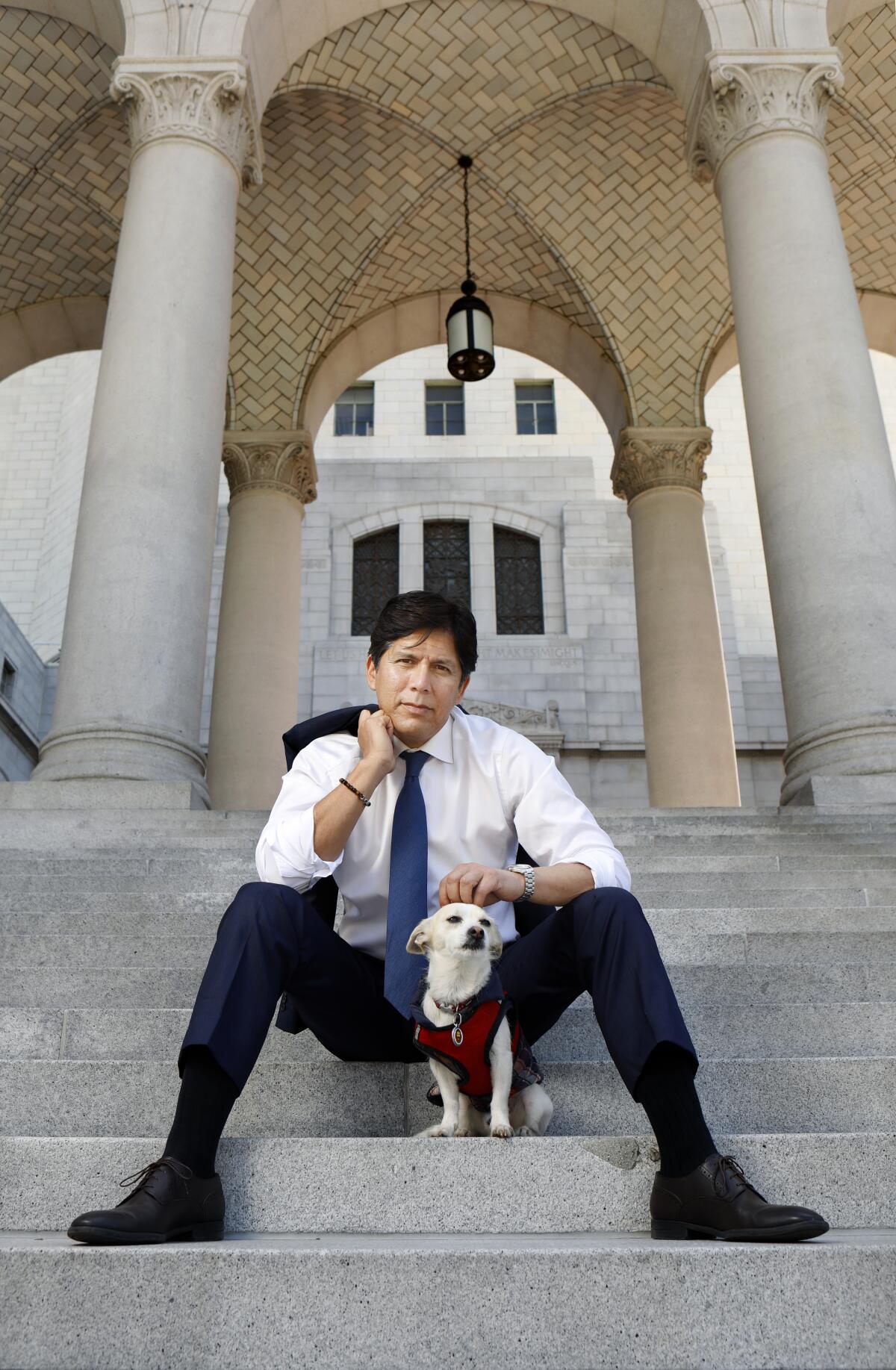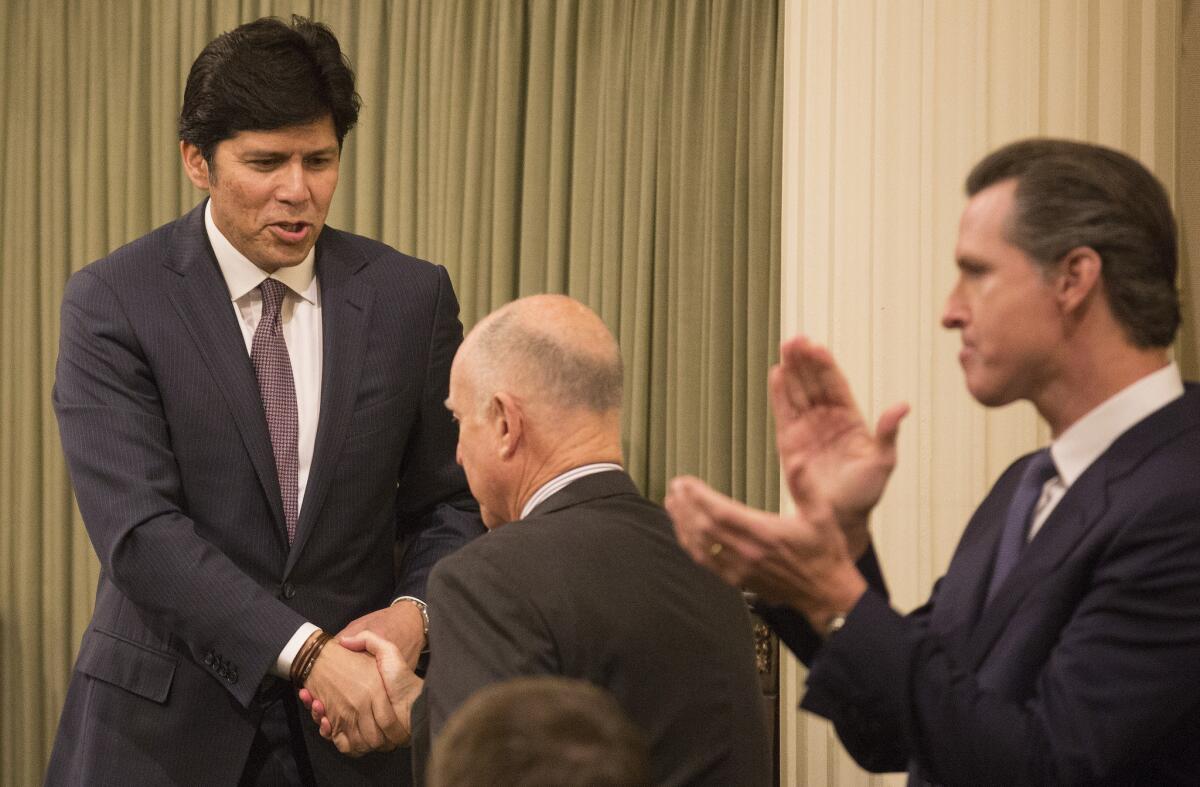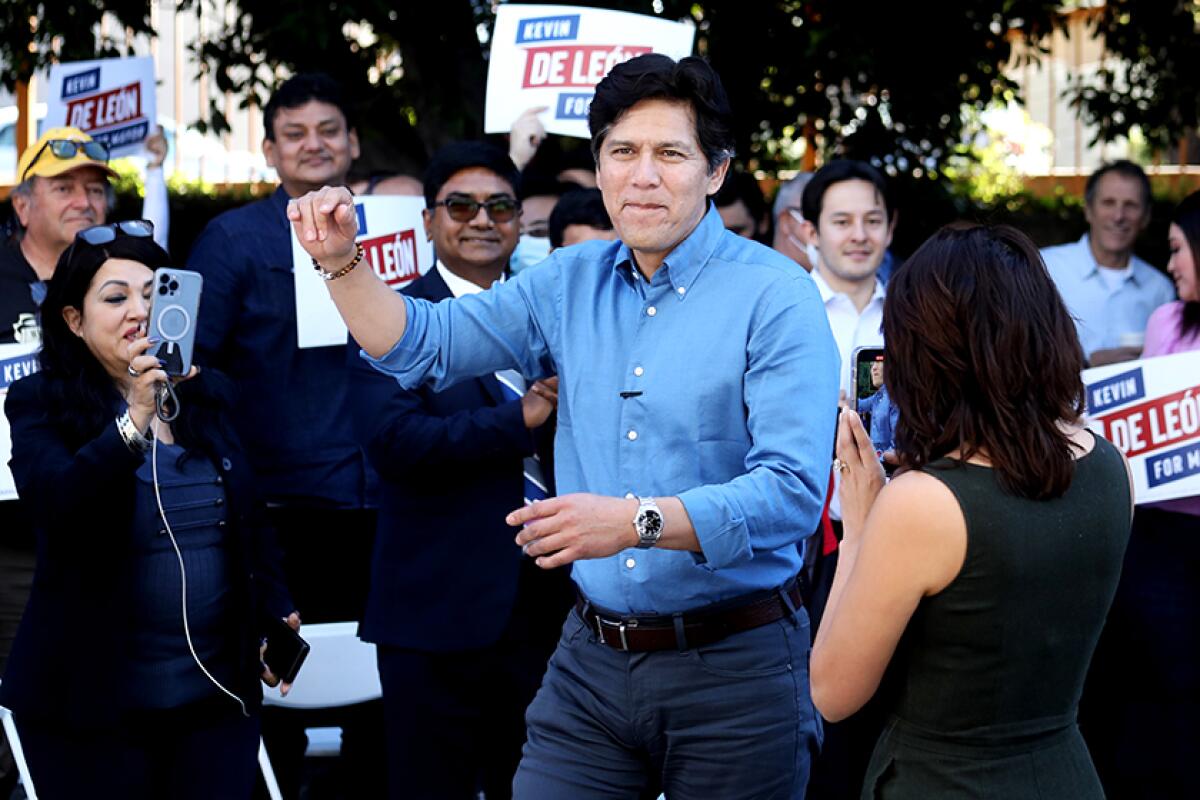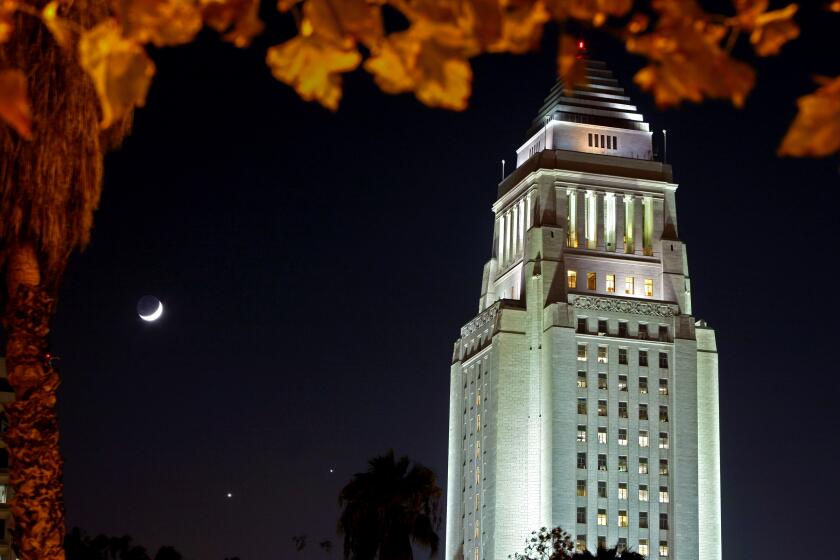Kevin de León’s bid for mayor may be lagging. But he’s resurrected himself before

As leader of the state Senate, Kevin de León was one of the most powerful politicians in California.
His future seemed wide open. Pundits speculated — would he run for governor? Lieutenant governor? Los Angeles mayor?
But his political star came crashing down after he challenged Dianne Feinstein for her U.S. Senate seat in 2018, promising to be tougher on Donald Trump than she was.
The internecine battle, which Feinstein handily won, divided the state’s Democrats and left some angry at what they saw as De León’s hubris for trying to usurp a political grand dame.
De León regrouped, eventually winning a seat on the Los Angeles City Council.
As one of 15 council members, his influence is much diminished from his days as a top player in Sacramento. And about a week before the June 7 primary, his bid to lead the city has failed to gain much traction.
As the only major Latino candidate for mayor in a city that is nearly 50% Latino, he is trailing far behind Rep. Karen Bass and billionaire Rick Caruso in most polls.
A recent poll by Bass’ campaign showed her at 34% and Caruso at 32%, with De León at 7% and about 17% of likely voters undecided.
But De León, 55, has never been one to give up without a fight.
With Los Angeles suffering from a surge in homicides and high-profile robberies, public safety and crime are at the forefront of the city’s mayoral contest.
As in his other campaigns, he has leaned heavily on his personal story, hoping that voters will relate to someone who has struggled as they have.
Colleagues and friends describe him as an aggressive, persuasive politician intent on improving the lives of the working class and immigrants, authoring legislation such as a “sanctuary state” measure during the Trump era.
At campaign events, he paints a picture of a Los Angeles divided between rich and poor.
He says he will build 25,000 housing units for homeless people by 2025, mandate affordable housing in every new development and create a department of public and mental health.
He wants the LAPD’s budget to stay roughly the same, while some of his opponents favor adding more cops.
“The question is very simple. What kind of city do you want?” De León asked during a campaign event in March. “Do you want a city that works only for the super wealthy and elite, or do you want a city that works for people like us — working people, middle class people?”
De León grew up in the low-income San Diego neighborhood of Logan Heights.
His mother, a Guatemalan immigrant, worked as a housekeeper in La Jolla mansions. His father was mostly absent from his life.
At one point, his mother rented a basement room in a home where other lodgers also lived. The ceiling leaked. He could only use the upstairs shower every once in awhile.
But De León gravitated toward positive influences. He took boxing lessons at the Barrio Station Youth Center. Fabian Nuñez, who would later become speaker of the state Assembly, was a childhood friend — a relationship that would prove pivotal when De León entered politics.
In addition to sports, the youth center offered lessons in civic engagement, with teens sometimes speaking at City Council meetings on issues such as environmental racism.
De León didn’t say much. But “he took everything in, in his own quiet way,” recalled Rachel Ortiz, the center’s executive director.
He started college at UC Santa Barbara but did poorly and lost his financial aid. Too ashamed to go home and face his mother, he slept in his car. He later graduated from Pitzer College.
In the early 1990s, after finding out that his friend was struggling, Nuñez brought De León to One Stop Immigration in Boyle Heights.
The executive director entrusted De León with a budget to open a new office in Santa Barbara offering English, history and civic classes to immigrants so they could pass citizenship exams after the 1986 amnesty program approved by Congress and President Reagan.
De León put fliers on cars outside English as a Second Language classes at community colleges and flagged people down as they passed through the gates.
Gradually, he gained students, expanding to dozens of locations from Ventura County to San Luis Obispo.
During this time, he slept in a storage shed next to his office. In 1994, his mother died of ovarian cancer.
Anti-immigrant sentiment was building in California, culminating in the passage of Proposition 187, which prohibited immigrants without papers from using state services and required local government employees to report people suspected of being in the country illegally.
De León visited hotels, fields and factories to rally immigrants to attend “la marcha por la dignidad” (march for dignity).
Tens of thousands flooded the streets of Los Angeles on Oct. 17, 1994. The proposition was eventually struck down in court.
De León then worked as an advocate for teachers unions — the National Education Assn. and California Teachers Assn. He got his first direct taste of politics as the campaign manager for Nuñez’s 2002 state Assembly run.
In 2006, when Nunez was Assembly speaker, he encouraged De León to run in a district that included Northeast Los Angeles against Christine Chavez, Cesar Chavez’s granddaughter.
After arriving in Sacramento, De León quickly climbed the ladder in the Assembly, winning the chairmanship of the Appropriations Committee and cementing his position in the Latino power structure.
In 2009, he was the front runner to replace Bass as speaker.
More on the mayoral race
According to a Times report, the matter was settled over a bottle of wine at the Los Angeles mayor’s mansion, then occupied by Antonio Villaraigosa. With Nuñez, Villaraigosa brokered a deal in which De León would become speaker and John A. Pérez — Villaraigosa’s cousin — would seek a state Senate seat.
But the plan was upended when Bass, who held the speakership, threw her support behind Pérez.
After losing his bid for speaker, De León was stripped of his Appropriations chairmanship and relegated to one of the dreariest offices in the state Capitol.
He eventually resurrected himself with a successful run for the state Senate in 2010.

Four years later, he was elected Senate leader, capping his comeback by becoming the first Latino to hold that post since 1883.
As a legislator, De León focused on the environment, the working poor, immigration and public safety. He was instrumental in the passage of a bill providing driver’s licenses to immigrants in the country illegally.
De León’s father was from Guatemala and had Chinese heritage. Despite their limited contact with each other, De León took an interest in Asian issues, co-sponsoring legislation apologizing to Chinese people for past discrimination and later joining the California Asian and Pacific Islander Legislative Caucus.
His proudest accomplishment, he says, was CalSavers, a retirement program for workers who wouldn’t otherwise have benefits, inspired by his Tía Francisca, who, like his mother, worked as a housekeeper and home care worker for the wealthy.
Dan Reeves, De León’s former chief of staff in Sacramento and now a consultant for his City Council work, said De León’s persistence and nontraditional approach sometimes irked his legislative colleagues but also achieved results.
In 2013, after a meeting with then-Gov. Jerry Brown about an unrelated issue, De León muttered under his breath about the immigrant driver’s license bill, which he believed was being held up by the governor, Reeves recalled.
As De León walked away, Brown promised to sign the driver’s license bill.
De León then revived the bill, which had been in limbo, pushing it through the Senate. It subsequently passed the Assembly, and Brown signed it into law.
That tendency to knock down boundaries came to a head with his decision to challenge Feinstein, which came as he was soon to term out of the Legislature and was figuring out his next step.
In 2017, after Feinstein drew boos for suggesting that Trump be treated with “patience,” De León saw an opening. He built his campaign on a promise to “shake up the D.C. playbook” and push back aggressively against Trump.
But he fell far behind in fundraising, with Feinstein injecting millions of dollars from her own pockets.
In a final indignity, many conservatives voted for him as a protest against Feinstein’s role in the Brett M. Kavanaugh Supreme Court confirmation hearings.
De León returned to Southern California, teaching at UCLA and doing consulting work for the AIDS Healthcare Foundation, a controversial nonprofit with a history of fighting L.A. planning decisions.
In 2020, he was elected to the L.A. City Council, taking office earlier than scheduled after his predecessor, Jose Huizar, was charged with racketeering and bribery.
De León touts his efforts to clean up homeless encampments in Highland Park, El Sereno, Boyle Heights and other parts of his district.
Soon after taking office, he negotiated deals to purchase two hotels using funds from the state program Project Homekey and constructing two tiny home communities.
De León lives in Eagle Rock with his dog Whiskey, a Chihuahua mix whose full name is Whiskers and who often goes to work with him. He has never been married and has a grown daughter.
Once a top figure in the state’s Latino political circles, De León has been unable to secure support from some key Latino leaders in his run for mayor.
Villaraigosa was among those who took the stage at a recent event for Bass at Mariachi Plaza — the heart of De León’s council district.
“Kevin de León is a friend, and I respect him,” Villaraigosa said in an interview with the Times. “But I have known Karen Bass for 50 years, and I have worked with her to help improve the quality of life in South L.A. and the Eastside, two communities that have been left behind. I have nothing against him. But I have known her for even longer. Those relationships matter.”
Caruso has pumped so much of his own money into the mayor’s race that he has dominated the airwaves, including Spanish-language TV, hampering De León’s ability to gain name recognition among his natural base.
Latinos are 48% of the city’s population and about a third of its registered voters.
“I think as you get closer to this primary, he’s got to manage his time better so he’s spending his time doing one of two things: meeting voters and making money,” said Nuñez, who has endorsed De León for mayor.
For some, De León’s run against Feinstein remains a sore spot.
Labor activist Dolores Huerta, who also appeared at the Mariachi Plaza event supporting Bass, said De León disrespected Feinstein at that year’s state Democratic Convention.
“He had a group of young people, and they were [protesting] her and insulting her, and he was leading the charge,” she said. “It’s OK for him to run against her, but the way he acted toward her was so disrespectful, so chauvinistic.”
De León said he knew the political risk but hewed to his principles and his immigrant background.
“Here is a top Democrat saying that we should be patient with Trump,” he said recently. “And I had to weigh the politics. Do I stay political? Or do I stay true to who I am as an individual, as a son of a single immigrant mother?”
Nuñez recalls all the “Who does he think he is?” comments. But De León has always swum against the current, Nuñez said.
The topic has been the subject of fervent speculation in recent weeks.
“There are people who believe everyone should wait in line for their place, and Kevin doesn’t follow the traditional political paradigm some folks think is important to follow,” he said.
Antonia Hernandez, head of the California Community Foundation, said De León’s connections in Sacramento and D.C. and his experience as a councilman will make him a well-rounded mayor.
But connecting with voters hasn’t been easy for De León. He has a natural reserve that can hurt him on the campaign trail, said Hernandez, who has known him since his days at One Stop Immigration. Hernandez said she does not endorse political candidates but has contributed to De León’s campaign.
“Kevin comes across as more nerdy,” she said. “He tends to sometimes come across as aloof and a loner, but really he’s a very nice, decent human being.”
Around older immigrants — people like his late mother — De León sometimes loosens up, joking with them in Spanish.
“Nuestro Kevin” — our Kevin, 70-year-old Carmen Maldonado, a housekeeper, said at a recent campaign event.

When a man in the crowd complained about homelessness, De León said he had a plan for the more than 40,000 people living on the streets of L.A. — and noted that he had been in their shoes.
“I was homeless once,” he said. “I showered with a bucket.”
He crouched down, grabbed a small cooler and motioned as though he were dunking a cup and pouring water over his head.
“Al estilo rancho,” he said. “Un baño vaquero.”
A cowboy-style bath. The crowd laughed.
Times staff writer James Rainey contributed to this report.
More to Read
Sign up for Essential California
The most important California stories and recommendations in your inbox every morning.
You may occasionally receive promotional content from the Los Angeles Times.












